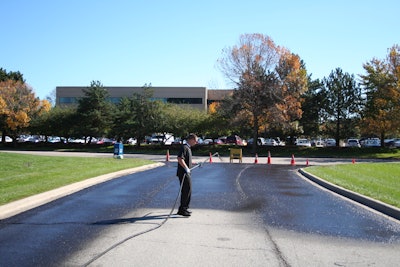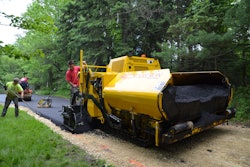
Almost every sealcoating contractor, once they reach a certain level of production, considers selling sealer. And the thought process is almost always the same: They know price is related to volume, so if they can sell sealer they can buy more, making it cheaper for their own sealcoating – plus make money on the sealer they sell. It’s a win-win!
But not so fast. While sealer manufacturers do rely on contractor resellers and distributors (more on the distinction below) to expand their sales in markets distant from their plants, there’s a lot more involved in the business of reselling sealer than most contractors consider.
“Selling sealer is a separate business and you have to regard it that way,” says Bill Maclean, The Brewer Company.
That means figuring out why you want to sell sealer, doing your homework on your market, examining the costs and profit potential, recognizing the impact selling sealer will have on your contracting business, understanding the pitfalls and challenges – essentially developing a business plan for the new business.
“Typically when contractors approach us about this they haven’t done any due diligence on their own and they haven’t completed or even thought of developing a business plan for becoming a distributor,” says Jeff Cayton, regional vice president at Neyra Industries. “Oftentimes people who want to resell sealer want to have control of the sealer in that market. They feel like they’re going to get a piece of everything that goes on in that market even if they aren’t doing the job. That’s not really true.”
Of course, that doesn’t mean contractors shouldn’t consider becoming a reseller or distributor. It just means contractors should enter this new type of business only after doing their homework and with reasonable expectations of what reselling sealer can provide.
Reseller vs. Distributor
Sealer manufacturers make clear that there is a distinction between a “reseller” and a “distributor,” and most manufacturers rely on (and prefer to rely on) distributors. A reseller is a contractor who simply sells sealer, perhaps carrying a few additional items in inventory but not much. A distributor, on the other hand, might or might not sell sealer but carries a full inventory of the support materials sealcoating contractors use.
“They are two different approaches. A distributor understands he is buying product and selling product and other tools or equipment or material and he understands how selling those additional items affects his business. That’s how he makes his money. That’s his business model. The distributor understands the importance of smaller items and sells those products,” says Lee Lowis, president of GemSeal.
He says the reseller, on the other hand, figures they will get a price break on sealer if they purchase more gallons, which they figure will add to their bottom line or at least offset some other costs. That combined with the money generated by selling those additional gallons to other contractors is often seen as a way to make or save some money.
“A lot of times resellers think they’re going to make more money on a gallon of sealer than they really are,” Lowis says. “Contractors often don’t understand the costs involved in becoming a reseller and they often don’t know that the revenue from reselling sealer is fairly small.
“When we sit down with them and do the math they realize that unless they’re going to be selling a significant volume they won’t really make much money,” Lowis says.
Maclean says that over the years The Brewer Co. has sharpened its requirements for becoming a distributor. “Twenty-five years ago if you bought sealer from us and wanted to resell that product we said okay, you are a distributor. Now, we want to understand your business model and commitment. What sealer product is right for your market? What other items will you need to support contractors who buy from you? Successful distributors support their customers with the products they need, ample supply and information. Today, we are an active partner in that effort” he says.
Among the inventory manufacturers expect distributors to carry are sand, additives, crackfiller, paint, tools – basically any products a contractor might need to buy.
“You really need to carry all the inventory a contractor needs, otherwise you don’t captivate that customer,” Cayton says. “If they have to go somewhere else to buy what you don’t have, why would they come to you when they could just go to one place instead of two?”
Girish Dubey, STAR Inc. president, says STAR distributors start by carrying the basics.
“They don’t have to carry every sealer product we make but they should buy the product that sells or is desired in their market,” Dubey says. “Their site also needs to have a source of clean water because the mix design is so important. They have to carry sand and at least a couple of different additives.”
Dubey says that in most cases, distributors who are also contractors will use the majority of inventoried products themselves, so carrying a full inventory doesn’t have to be burdensome.
“As a contractor they know what products are in demand in their market and that’s where they should start their inventory. They don’t have to maintain an inventory of items if they don’t have the space from the get-go but eventually we expect them to work their way up.”
What is the Profit Potential?
While reduced pricing is usually the driving force behind contractors looking to resell sealer, price should not be the determining factor.
“If you understand your labor and your overhead costs and sell profitable work, you’re going to make a whole lot more money than you’ll make by reselling sealer,” Maclean says.
“Reselling sealer is not a revenue stream if you’re looking at it the right way. It’s a different business model and approach. It’s an add-on for your business because it drives your sealer purchases a bit higher to get a few cents off a gallon of sealer,” Lowis says.
“Hypothetically, say you make 25 cents on a gallon of sealer. You’ll make more money applying that gallon on the pavement than by selling that tank of sealer. Some people think that reselling sealer is a higher margin and bigger profit than it really is.”
Cayton agrees. “Margins on sealer are very thin so you have to do huge volume to make any real money on it. Let’s say you’re working on 10% margin on a product that’s $2 a gallon; that’s 20 cents profit per gallon. If you’re doing a $5,000 job at 10% margin you’re looking at $500 profit. If they spend time getting one or two more jobs for the year they will make better money than they will reselling sealer all year long. I generally discourage reselling because if you really do the due diligence, your homework and the math, a lot of times the math doesn’t work.”
Doing Your Homework
Manufacturers emphasize that contractors interested in becoming distributors or resellers need to do their homework.
“People think they want to be a distributor but they’re often surprised at what’s involved,” Cayton says. He says, for example, that many contractors have to hire an extra person to staff the yard all day to sell sealer to other contractors. “If that’s the case it’s just not going to be that profitable.”
He says if you already have that person on staff, and he (or she) is at the yard all day, then that cost concern is alleviated – although meeting with contractors and filling tanks and answering questions and accepting payment will take time away from whatever other duties that person normally has.
Because markets are so different each situation needs to be considered on a market-by-market, case-by-case basis to determine if it is financially beneficial to the contractor – and to the sealer manufacturer.
“Not all markets are large enough to generate sufficient sales for distribution to be profitable as a standalone business,” Maclean says. “If you’re in the middle of nowhere with a small number of potential customers then reselling without the larger commitments of time and inventory might make sense, but you still need to do your homework – who will you sell to, what product(s) do they use, will they buy from you, etc.”
“But if you’re in a small market with one or more established distributors who stock what their customers want, you would have a tough time competing with them and your time is better spent selling work.”
“They need to start by developing a business plan to run a distributor business,” Cayton says. “After they’ve done that they can ask themselves if it is it really a direction they want to go. Nobody is going to know their market better than the contractor, so once they work through developing a business plan they’ll have a much better idea of what they will be facing and the kind of business they’ll be running – which is very different from a contracting business.”
Selling Sealer to Competitors
Part of doing your homework includes understanding that you will be selling material to some of your competitors. Even in friendly situations selling to your competition has its pitfalls, so part of your business plan should include learning about and understanding your competition.
Cayton says that it can be difficult for an established contractor to find people to buy from him because contractors might not want to buy from their competition – and that’s something that should be addressed in the business plan.
“You have to be careful about selling to your competition,” Cayton says. “If you’re competing on jobs with people you sell to they’re not going to be very excited about buying sealer from you. So do you know your competition?”
Maintaining a balance between “competing with” and “selling to” other contractors can be touchy, and several manufacturers suggested distributors cultivate relationships with smaller contractors with whom you don’t compete.
“If you are a commercial applicator you can refer driveway work to smaller contractors or you can take the work and sub it to them,” Maclean says. “Many successful contractors who understand their labor, mobilization and overhead costs get inquiries on jobs they don’t necessarily want. If you’re a distributor you can pass those jobs along to smaller contractors who buy from you and strengthen that relationship.”
In fact, Dubey says that’s how many contractors become resellers or distributors.
“Once they reach a certain size contractors make the decision that they don’t want to handle the smaller jobs, so either they sub it out or sell sealer to the smaller contractors to do the work with the stipulation that they buy the material from them.”
Should You Do it?
So, bottom line: Should you think about becoming a reseller or distributor.
“I don’t think there are a lot of advantages for contractors, to tell you the truth,” Cayton says. “If they are really going to be able to get their quantity up to whatever the needed level is, then bulk buying could be a minor advantage. And there might be some additional advantages as far as cash flow is concerned. But even then it will take several years before the initial costs are paid back because you have to buy and build up all the inventory you need to run a successful distribution business.”
“If they approach it as an incremental part of their business that can offset some of their other costs –and they don’t experience any setbacks – then okay. It’s not a bad idea,” Lowis says, adding that assumes they don’t have to hire another person to staff their yard. “If on a Saturday afternoon they need to send a crew guy out to fill 150 gallons of sealer, they probably didn’t make any money on that sale.”
Maclean says he sees fewer contractors each year pursuing distribution. “If your market is such that there are no distributors, no company stores near you or existing distributors really aren’t supporting there customers, it may still be an opportunity, he says.”
“People who are unsuccessful becoming distributors are people who have very lofty ideas,” Dubey says. “People who have done their homework and who have some skin in the game tend to be successful because they have reasonable expectations.”












![Lee Boy Facility 2025 17 Use[16]](https://img.forconstructionpros.com/mindful/acbm/workspaces/default/uploads/2025/09/leeboy-facility-2025-17-use16.AbONDzEzbV.jpg?ar=16%3A9&auto=format%2Ccompress&fit=crop&h=135&q=70&w=240)








